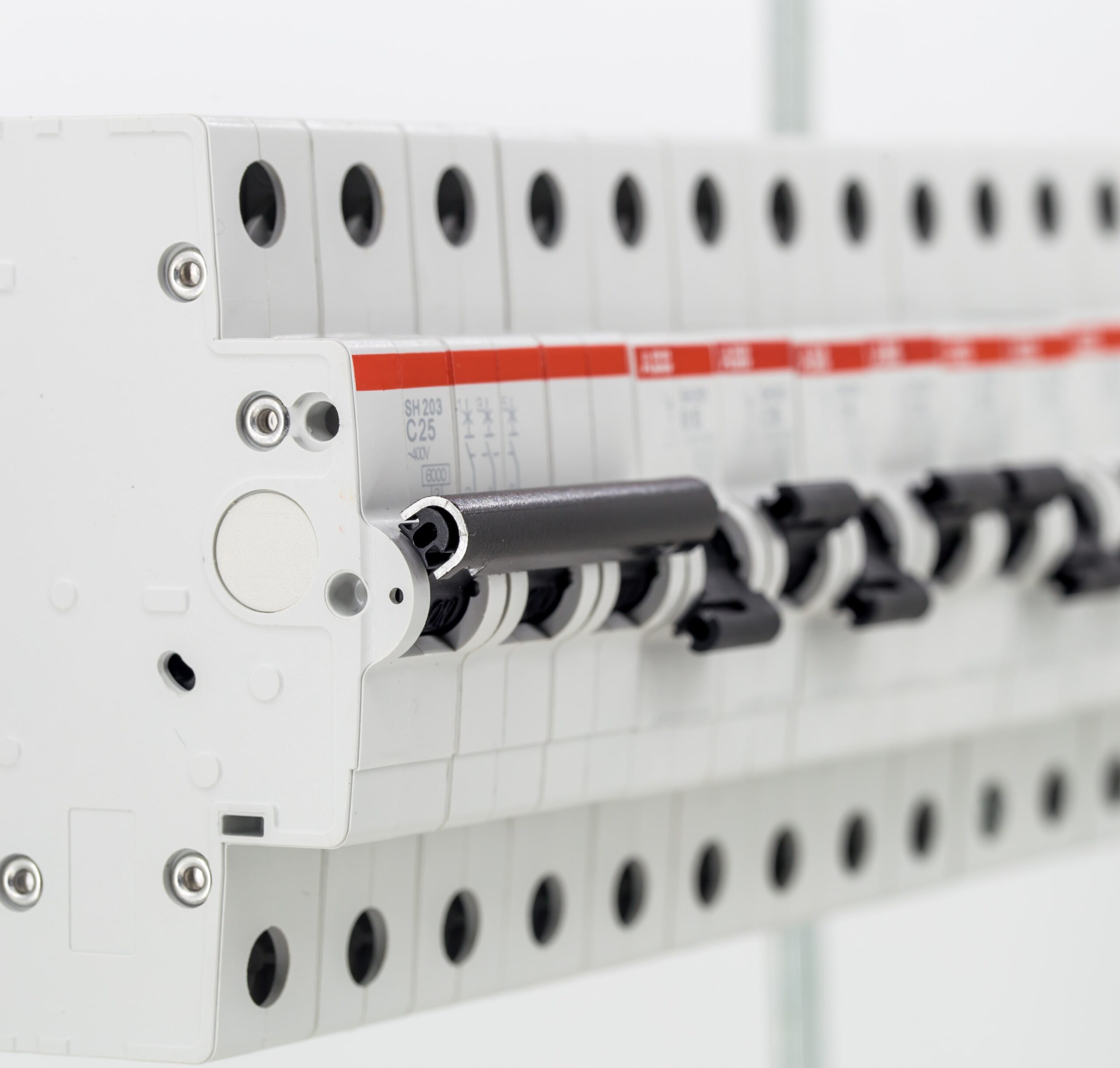How to Choose the Right Circuit Breaker

Introduction:
It can be difficult to choose the proper circuit breaker for your residence or place of business. It’s critical to know which breakers are ideal for your needs, given the wide range of sizes and types available. In this blog post, we’ll go through the many kinds of circuit breakers, safety issues, and how to choose the proper size and amperage for your specific application. From there, you’ll be able to choose the ideal circuit breaker for your requirements.
Understanding the Basics of Circuit Breakers
For you to choose the best circuit breaker for your house or place of business, you must first understand its fundamentals. In the event of an overload or short circuit, circuit breakers act as electrical switches to automatically turn off electricity in a circuit. They are essential in defending against electrical fires and safeguarding electrical systems.
A circuit breaker’s basic components are a switch, a current sensing system, and a trip system. The current-detecting device tracks the movement of electricity, and the switch enables human control of the circuit. The trip mechanism opens the switch and turns the power off when an excessive current is detected.
There are several different types of circuit breakers, such as conventional, AFCI, GFCI, and combination breakers. Each kind has particular uses and functions. The most typical breakers, standard breakers, are appropriate for the majority of residential and commercial applications. Electrical arcs, which have the potential to start fires, are protected from AFCI breakers. Electrical shocks are prevented in places with water by GFCI breakers. GFCI and AFCI protection are both provided via combination breakers.
We shall examine the many kinds of circuit breakers and their unique applications in the next section. Remain tuned!
Types of Circuit Breakers and Their Applications
There are various different types of circuit breakers available, each having a special set of uses and applications. Let’s explore the several categories of circuit breakers and each one’s unique use.
Standard Breakers:
These circuit breakers are the most prevalent and are appropriate for the majority of home and commercial applications. Any electrical system must include them because they offer protection against overloads and short circuits.
AFCI Breakers:
Arc Fault Circuit Interrupters, or AFCI breakers Electrical arcs, which have the potential to start fires, are protected by these breakers. They are frequently utilized in spaces like bedrooms, living rooms, and dining rooms where electrical arcing is more likely to happen.
GFCI Breakers:
Ground Fault Circuit Interrupter (GFCI) Breakers: GFCI is an acronym for this device. In locations where water is prevalent, such as restrooms, kitchens, and outdoor outlets, these breakers prevent electrical shocks. In order to avoid electrical accidents, they are made to immediately detect any imbalance in current flow and cut off power.
Combination Breakers:
Combination breakers provide both AFCI and GFCI protection, as their name implies. They are frequently utilized in spaces like laundry rooms and utility rooms that need dual protection.
It’s critical to select the proper kind of circuit breaker depending on the unique needs and specifications of your electrical system. The position of the circuit, the presence of water, or the risk of electrical sparks, as well as any unique issues for your house or place of business, should all be taken into account. You can make an informed choice and guarantee the security of your electrical system by being aware of the many types of circuit breakers and their applications.
Factors to Consider When Choosing a Circuit Breaker
There are various crucial variables to take into account while purchasing a circuit breaker. Prior to anything else, you must ascertain the maximum amperage of the circuit you’ll be guarding. You can choose a breaker with the right ampere rating using this information. You should also think about the kind of circuit you will be guarding and its particular safety specifications. For instance, a GFCI breaker is required if the circuit is located in a moist area, like a bathroom or kitchen, to prevent electrical shocks.
Also essential is making sure the circuit breaker is appropriate for your electrical panel. Be sure to read the specs before choosing a breaker because some panels may only allow a certain type or size. You may select the ideal circuit breaker to guarantee the security and effectiveness of your electrical system by taking these elements into consideration.
Ampere Rating and Trip Characteristics
The ampere rating is one of the most crucial parameters to take into account when selecting a circuit breaker. The maximum current that the breaker may safely handle without tripping is determined by the ampere rating. It is crucial to select a breaker whose ampere rating equals or surpasses the circuit’s maximum allowable current flow. Picking a breaker with a greater ampere rating may not offer sufficient protection and can result in overheating and potential electrical risks. Conversely, picking one with a lower rating may cause frequent trips.
It’s critical to take the breaker’s trip characteristics into account in addition to its ampere rating. When an overload or short circuit develops, the breaker’s trip characteristics govern how quickly the power will be cut off. Sensitive equipment is well protected by fast-acting breakers, which trip practically immediately. Standard breakers are appropriate for the majority of applications and feature a medium trip speed.
Temporary current surges are permitted by slow-acting breakers since they take some time to trip before cutting the power. In order to choose the best circuit breaker for your unique electrical demands, it is essential to understand the ampere rating and trip characteristics of each model.
Single-pole vs. double-pole circuit breakers
Circuit breakers can be either single pole or double pole, and both have distinct functions in electrical systems.
A single circuit is protected by a single-pole breaker, which normally handles 120 volts of power. These breakers are frequently used for outlets, small appliances, and lighting fixtures. Both the wire connecting to the electrical panel and the wire connecting to the circuit are present.
A double-pole breaker, on the other hand, is made to handle larger voltages, typically 240 volts, and safeguard two different circuits. Larger equipment like electric ranges, dryers, and air conditioners frequently require double-pole breakers. In addition to two wires connecting to the circuits, they also have two wires connecting to the electrical panel.
It’s crucial to take your electrical system’s unique requirements into account while deciding between single-pole and double-pole breakers. A twin-pole breaker is the best option if you are installing a larger appliance or need to protect a higher-voltage circuit. However, a single-pole breaker will work just fine for minor circuits and appliances.
You can make an informed choice and make sure your electrical system is safe and effective by knowing the distinctions between single-pole and double-pole breakers.
Compatibility with Your Electrical Panel
It is essential to confirm compatibility with your electrical panel when selecting a circuit breaker. Before choosing a circuit breaker, it is vital to note that not all circuit breakers are compatible with all panels. Make sure the breaker you select fits properly because some panels may only accept specific types or sizes.
A number of issues, such as circuit breaker malfunctions, electrical system failures, and even significant safety dangers, might arise from installing a mismatched breaker. To make sure the breaker and your electrical panel are compatible, it is crucial to complete your study and, if necessary, consult a specialist. By going the extra mile, you can protect your financial situation and guarantee the effectiveness and safety of your electrical system.
Choosing a Circuit Breaker for Special Applications
The appropriate circuit breaker selection is even more crucial when it comes to specific applications. These applications could have particular electrical needs that call for particular kinds of circuit breakers in order to function and perform safely. High-powered machinery, delicate electronic devices, or crucial systems like healthcare facilities are a few examples of particular uses.
Circuit breakers with high ampere ratings are essential for high-power machinery, such as industrial motors or large-scale manufacturing machines, to accommodate the higher current demands. These breakers could also need particular trip qualities to guard against motor overloads or short circuits.
Circuit breakers with slow trip times are necessary for sensitive electronic equipment, such as servers or data centers, to prevent power disruptions that could harm the machinery. In order to prevent electrical arcs, which can result in data loss or equipment malfunction, AFCI breakers may also be required.
Circuit breakers with redundant or backup systems may be necessary in healthcare facilities where electrical dependability is crucial for patient safety. Thus, even in the case of a breaker trip or power outage, vital equipment—such as life support systems or medical imaging devices—will continue to function.
The particular needs and requirements of the application must be carefully taken into account while selecting the appropriate circuit breaker for special applications. It is strongly advised to get the advice of a licensed electrician or engineer to make sure the selected circuit breaker complies with all safety and performance requirements.
Conclusion:
A critical step in making sure your electrical system is safe and functional is choosing the appropriate circuit breaker. Making an informed choice requires a basic understanding of circuit breakers, including their types and applications. In the essay, it is stressed how crucial it is to take into account elements like ampere rating, trip characteristics, single-versus-double-pole breakers, and compatibility with your electrical panel. Additionally, it underlines the need for specialized circuit breaker solutions for unique applications like industrial machinery or delicate electronics.
To ensure compliance with safety and performance regulations, it is ultimately essential to speak with a certified electrician or engineer. You can safeguard your electrical system, avoid potential risks, and guarantee the effective running of your house or business by making an informed decision.



